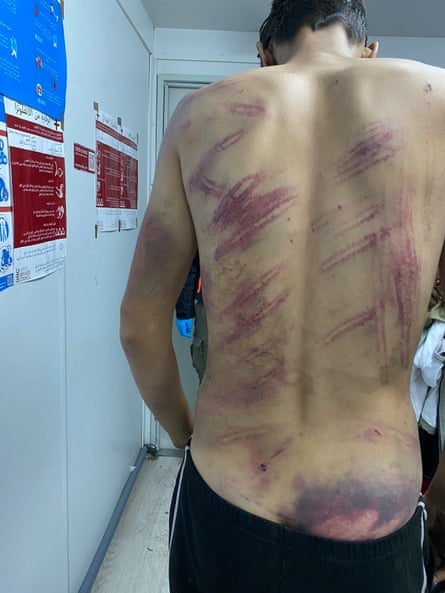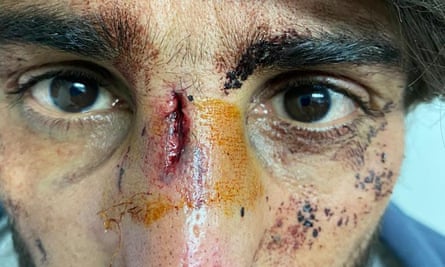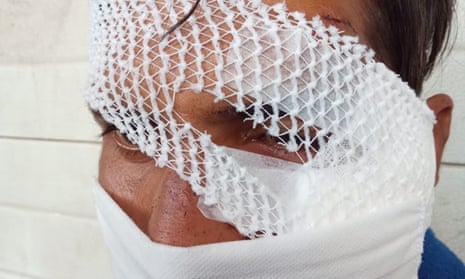People on the Balkans migrant trail have allegedly been whipped, robbed and, in one case, sexually abused by members of the Croatian police.
The Danish Refugee Council (DRC) has documented a series of brutal pushbacks on the Bosnia-Croatian border involving dozens of asylum seekers between 12 and 16 October.
The Guardian has obtained photographs and medical reports that support the accounts, described by aid workers as “sickening” and “shocking”.
“The testimonies collected from victims of pushbacks are horrifying,’’ said Charlotte Slente, DRC secretary general. “More than 75 persons in one week have all independently reported inhumane treatment, savage beatings and even sexual abuse.’’
According to migrants’ accounts, the pushbacks occurred in Croatian territory over the border from Velika Kladuša in Bosnia, close to Šiljkovača – a tented forest settlement of around 700 refugees and migrants.
“All of the persons interviewed by DRC bore visible injuries from beatings (bruises and cuts), as a result of alleged Croatian police violence,” reads the DRC report. “According to the statements provided by interviewed victims (with visible evidence of their injuries), pushbacks included brutal and extremely violent behaviour, degrading treatment, and theft and destruction of personal belongings.” One of the testimonies includes a report of serious sexual abuse.
On 12 October, five Afghans, including two minors, crossed the Croatian border near the Šturlić settlement. On the same day, near Novo Selo, an uniformed police officer stopped them and then called two more officers. One of the migrants ran, and the other four were detained at a police station. Two days later they were taken to court, where they say they were to “appear as witnesses in the case launched against the fifth member of the group – the one who escaped”, who had been accused of violent behaviour towards police.
The asylum seekers told the DRC that the original officers then took them “to some unknown location, where they were put in a van in the charge of 10 armed people, dressed in black and with full face balaclavas, army boots and with flashlights on their foreheads”. Their money was taken, their belongings torched and they were ordered to strip to their underwear. The migrants allege that they were forced to lie face down on the ground.

“One man in black was standing on the victim’s hands, preventing any movements,” reads the report. “Legs were also restrained. Once the person was hampered, the beating started. They were punched, kicked, whipped and beaten.” Medical reports confirm that migrants’ injuries are consistent with the use of a whip.
One migrant, MK, says at this point he was sexually assaulted by a man using a branch.
Mustafa Hodžić, a doctor in Velika Kladuša, examined the man. “The patient had wounds all over the back of his body, on his back and legs. I can confirm the signs of clear sexual violence … I have never seen anything like it. Even if it isn’t the first time as a doctor [that] I have seen signs of sexual violence on migrants, which, according the asylum seekers’ accounts, were perpetrated on Croatian territory by Croatian officials dressed in black uniforms.”
One Pakistani migrant told of being intercepted with two others near Croatia’s Blata railway station. The police allegedly ordered them to strip naked before loading them into a van and taking them to a sort of garage, where five other migrants were waiting to be sent back to Bosnia. Awaiting their arrival were men dressed in black.
“They started to beat us with batons, and the third one took his mobile phone and took a selfie with us without clothes,” the Pakistani man said. “The first four of us were on the ground, and we lay next to each other, naked and beaten, and the other four were ordered to lie on us, like when trees are stacked, so we lay motionless for 20 minutes. The last one was a minor. He was from the other group; I saw when the police officer ask him where he was from. He tried to say that he is a minor. He was beaten a lot, and when it was his turn to take off his clothes, he was beaten even more.”
One man added: “A minor from the second group fainted after many blows. His friends took him in their arms, and one of the police officers ordered them to lay him down on the ground. Then they started hitting them with batons. Before the deportation, police told us: ‘We don’t care where you are from or if you will return to Bosnia or to your country, but you will not go to Croatia. Now you have all your arms and legs because we were careful how we hit you. Next time it will be worse’.’’

Small groups of asylum seekers attempt to cross from Bosnia into Croatia nightly on the migrant trail into western Europe. The EU’s longest internal border, it is patrolled by police armed with truncheons, pistols and night vision goggles. Aid workers, doctors, border guards and UN officials have documented systematic abuse and violence perpetrated along the border stretch for several years.
Last May, the Guardian documented a case of more than 30 migrants who were allegedly robbed and had their heads spray painted with red crosses by Croatian officers.
The UNHCR has asked the Croatian government to set up an independent assessment of the border situation.
The details of the latest pushback are in a report that the DRC has shared with the European commission, which has yet to investigate.
‘’The Croatian government and the European commission must act to put a stop to the systematic use of violence,” said Slente. ‘’Treating human beings like this, inflicting severe pain and causing unnecessary suffering, irrespective of their migratory status, cannot and should not be accepted by any European country, or by any EU institution. There is an urgent need to ensure that independent border monitoring mechanisms are in place to prevent these abuses.”
Croatian police and the ministry of the interior have not responded to requests for comment.

In June, the Guardian revealed EU officials were accused of an “outrageous cover-up” for withholding evidence of the Croatian government’s failure to supervise border forces. Internal emails showed Brussels officials were fearful of full disclosure of Croatia’s lack of commitment to a monitoring mechanism that EU ministers had agreed to fund.
In January, a commission official warned a colleague that Croatia’s failure to use money earmarked two years ago for border police “will for sure be seen as a scandal”.
The recent accusations come as the commission presented its final report on the grant, in which Croatia asserted that the co-financing project had “helped make the implementation of activities of border surveillance more conscientious and of higher quality, with emphasis on the respect of migrants’ rights guaranteed under international, European and national legislation”.
Regarding allegations of abuse, Croatian authorities stated: “Every single [piece of] information and every single complaint was inspected in the process called internal control. We did not establish that the police officers committed any criminal or disciplinary offence in any of the cases.”
Clare Daly, an Irish MEP, is among those who have raised concerns in Brussels. “The blood of these people, so horrifically mistreated on the Croatian border, is on the hands of the European commission. They have enabled this violation of fundamental rights by ignoring the facts presented to them by NGOs and MEPs that all was not well. They turned a blind eye time and again, and now these horrible events have occurred again, even worse than before.”
She added: “The last time such behaviour occurred, the commission rewarded Croatia with an extra grant even bigger than the first one, and said they were happy with how the funds had been spent … when is someone going to be held accountable for these crimes against humanity?”
